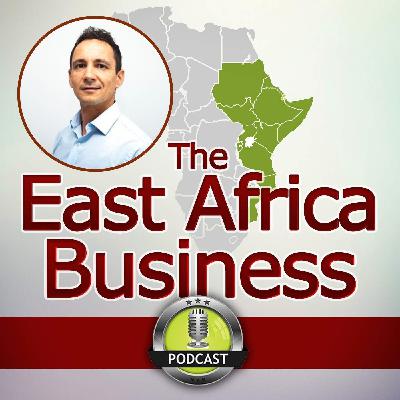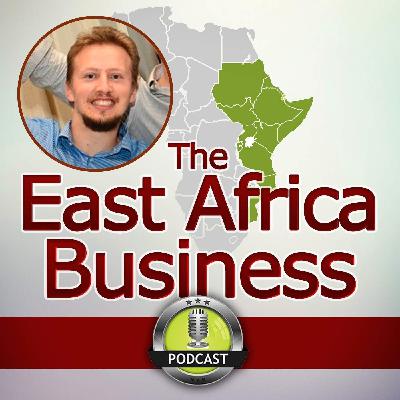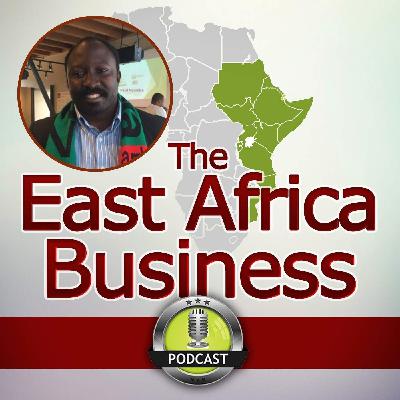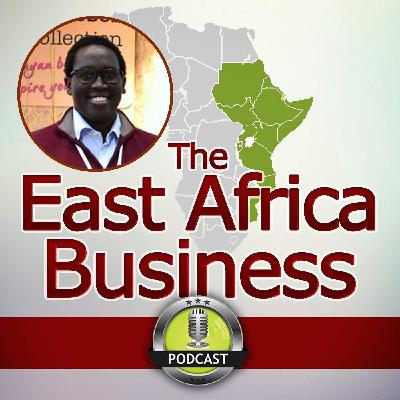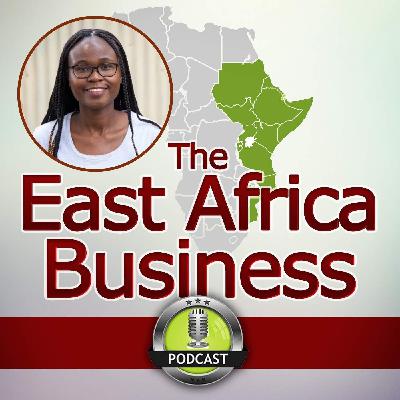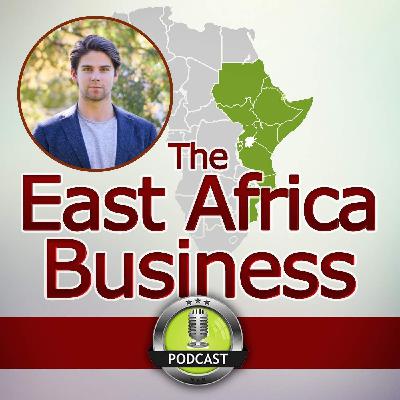Discover The East Africa Business Podcast: African Start ups | Investing | Entrepreneurship | Interviews
The East Africa Business Podcast: African Start ups | Investing | Entrepreneurship | Interviews

85 Episodes
Reverse
This week's episode comes from Kibera, Kenya's biggest, and one of Africa's largest, informal settlements.
Life is tough here, and many talk about the "slum mentality" where a lack of opportunities leads to drug abuse, crime and a general sense of despair.
Julius Otieno is an inspiration for those in his neighbourhood.
After dropping out of high school as his family could no longer pay his school fees he combined the talents of his mother (a tailor) and his father (a cobbler) to make colourful, hand-made shoes from discarded pieces of African fabric.
The shoes are a hit, with both Kibera residents and expatriates (such as myself).
Julius and I talk about his story, how the shoes are made, and the impact of the business in reducing environmental waste and providing meaningful employment to the Kibera youth.
We also discuss Julius' trip to Paris, after he was selected by an ambassador to present at a trade show there.
This involved Julius needing to get funding to get a passport in order to leave the country, let alone have his experience on a plane.
For more information on the business, head to the show notes where you can find the Re-afric website, as well as a blog post I wrote several months ago about meeting Julius for the first time.
You can also head to www.theeastafricabusinesspodcast.com where you can learn about opportunities to help companies like Julius', whether that be expertise or funding, should you so wish.READ MORE AT:https://theeastafricabusinesspodcast.com/2019/12/19/from-rags-to-riches-re-afric-make-colourful-shoes-from-recycled-african-fabric-that-sell-worldwide
This week we're featuring what has to be one of my favourite business models to date.
One of the dominant themes in East Africa is that individuals and businesses don't have the cash to afford products and services that would earn them more money, and make their lives better.
To open up access to electricity, off-grid solar power systems are now commonplace, provided on a Pay As You Go basis.
This model is being adopted in other markets too, such as cooking fuel, irrigation pumps and TVs.
Where it becomes especially powerful is, in my opinion, if the financing can be for a revenue-generating asset.
The new owner gets a top of the range piece of kit and is able to pay for it through the additional income they earn from it.
This is what Ilara Health has done for medical diagnostics.
Ilara Health takes the most advanced, modern equipment (often smartphone-based) that offer the same results and cost only a few thousand dollars, and then provide them to peri-urban medical clinics in Kenya who then pay back in installments.
The result - routine ultrasound tests become available to a local population at an affordable rate, (rather than spending hours to travel to have one), medical clinics can grow their business, and Ilara Health has a sustainable business model.Emilian also has a number of top tips on starting any business in Africa which come from over 20 years of him running and investing in companies on the continent.
I'd strongly recommend following him if you're interested in building ventures in the region.
READ MORE AT:https://theeastafricabusinesspodcast.com/2019/12/12/affordable-healthcare-for-the-masses-ilara-healths-sustainable-business-model-saves-lives
This week we're talking with two friends who have set up a business making socks in Kenya.
Both Vidyesh and Bishell grew up in Nairobi to entrepreneurial families, and after education in the UK returned home to begin a business.
They are also friends with Sumit, who featured in the board game cafe episode.
Vidyesh and Bishell decided on socks, as they felt there was a gap in the market and that by starting with a relatively discrete market (school socks) they could grow the business.
It's a very interesting conversation that goes through the practicalities of building a manufacturing company in Kenya.
One of the challenges they state is, for example, the high cost of electricity, and its unreliability, but also the opportunities that come from getting a loyal customer base in an emerging economy.READ MORE AT:https://theeastafricabusinesspodcast.com/2019/12/05/the-opportunities-and-challenges-of-making-affordable-socks-in-kenya
Do you know what the world's most expensive nut is?
It's the macadamia nut.
Similar in shape and colour to a chickpea, but up to twice the size, it's originally from Australia and is now grown in several tropical locations around the world.
In Kenya, the first trees were grafted and planted in the 1970s with a few disparate growers and aggregators each individually trying to generate a market.
Ten years ago Charles Muigai founded Nutpak an industry body for nut processors in Kenya.
They deal with peanuts and cashews too, but the real business in macadamias where they represent Kenyan producers both at a national government level and internationally.
Charles and I chat about all angles of how this industry is growing in Kenya including the minimum "farm gate" price set for macadamia farmers, the process by which they are packaged and ultimately exported, and lessons other burgeoning industries can take for their role on global stage.READ MORE AT:https://theeastafricabusinesspodcast.com/2019/11/28/cracking-the-nut-industry-how-kenya-adopted-the-worlds-most-valuable-nut-with-charles-muigai
In this episode, I speak with Sabina Karumba about how she and her husband started Chia Africa.Most businesses have an interesting formation story, though this one is one of the best I've heard in a while.Sabina and her husband were watching TV one evening in 2012 when a doctor came on the show and explained the health benefits of chia seeds.Compelled to learn more they undertake research and a few months later are planting their own chia plants in Western Uganda.This is the first commercial plantation of chia seeds on the continent, and after going around with samples of what they grew they both quit their day jobs and go full time on the business.A few years later and they are the premier producer in the region, trying to keep up with demand despite other people entering the market too.Sabina and I talk about lots of interesting things such as how chia seeds should only be grown within 5 degrees of the equator, the genesis of becoming Africa's first chia seed producers (despite never having farmed), and keeping up with the demand for the superfood.One thing which Sabina downplays, but I thought was particularly impressive is her attitude to sales.Two of the biggest breaks for the company came with being listed by a major supermarket, and then one of the region's largest distributors.In both cases, she just turned up unannounced at their offices, asked to see the owner and after sitting down with them, sold them on making big orders for Chia Africa in just one meeting.The reason I think is that Sabina is clearly incredibly passionate about the power of chia seeds, and believes everyone should have them in their diet.Her pitch is pretty simple: it has amazing health benefits that can change people's lives, people just don't know about it yet, make sure you have some in stock.You can learn more about the health benefits, the company, as well as pictures of the chia plant which yields chia seeds (which I'll admit, I never knew what they looked like) by heading to the show notes for this episode at www.theeastafricabusinesspodcast.comREAD MORE AT:https://theeastafricabusinesspodcast.com/2019/11/21/chia-seed-investors-the-surprising-story-of-how-chia-seeds-came-to-be-grown-in-africa
In this episode, I catch up with Johannes, co-founder of Lynk.We initially spoke back in late 2016 along with his co-founder Adam. You can listen to the interview by searching for the episode on 'How Lynk is building a "TaskRabbit for Kenya"'.The company has continued to grow over the years, and this time we meet in the new Lynk house/ office. With a new round of funding secured their employee numbers are up to 45 and, well, they need a new place to house people.Johannes and I dig into how the business has grown and evolved over the past few years. The company began by offering services to individuals, and whilst this is still part of their platform, a much bigger side of the business that has grown is B2B.One of the things Lynk now it is effectively a construction company.They use their roster of workers to effectively and efficiently build factories, as well as do the interior design and facilities management. Regarding the individual services that are offered, such as beauticians, the model has also evolved into more of a micro-franchise. Practically this means that Lynk defines the services and how they should be delivered, and then give new workers on the platform a start-up loan to purchase the necessary materials and build their business on Lynk.READ MORE AT: https://theeastafricabusinesspodcast.com/2019/11/14/how-lynk-raised-1-3m-and-evolved-from-taskrabbit-for-kenya-to-micro-franchising-and-construction
In this catch-up episode, I chat with Caitlin who runs Flare.Caitlin and I first spoke in late 2016, and you can listen to the original interview by scrolling down to the episode named Ambulances.The premise then was that Flare would become a technology platform to connect people with ambulances much in the way that Uber has developed the model of hailing a driver through their app.Whilst the vision of providing world-class emergency dispatch services remains unchanged, the company has developed more of a human touch.As Caitlin and I discuss, a core offering they now have is a 24/7 dispatch hotline where trained medical professionals consult with callers before dispatching them to the appropriate provider.We also talk about other things that have come from running the business over the past three years.How they've been cautious to not scale too quickly, how large corporates are signing up to the Rescue.co service, and their considerations for international expansion.The interview takes place in the garden of the Flare house (you may notice a number of companies such as Lynk and SunCulture operate from residential homes) and so there may be some background noise, not least from Koko - the office dog who comes over halfway through.READ MORE AT:https://theeastafricabusinesspodcast.com/2019/11/07/from-uber-to-call-centre-why-flare-decided-on-the-human-touch-for-emergency-dispatch-in-kenya
In this second episode from Zambia, I speak with an entrepreneur who has found his niche and is fully focused on it. Paul Nyambe grew up farming goats in rural Zambia. He and his family were unable to earn money from the animals which always struck Paul as frustrating.Years later he built a career in food sales, specifically ice cream, which meant had relationships with large supermarkets and restaurants.One noticeable thing missing from the menus and shelves was goat meat.In 2012, Paul quit his job and started Zamgoat.The vision is simple: to sell high-quality goat meat to the public.In our conversation, we talk through various parts of the business such as the profit margin on a goat, the barriers to entry for getting a goat in supermarket aisles, and the reasons why Paul is so positive that goat products are the next big thing for consumers around the world.We also chat about the potential for more value creation in goat products, such as making rugs from goat skins and various other products.If, on the off chance, you happen to know someone who'd be interested in advising Paul in this regard, please let me know via the contact form on the podcast website - www.theeastafricabusinesspodcast.comREAD MORE AT:https://theeastafricabusinesspodcast.com/2019/10/31/why-zamgoat-believes-goats-are-the-next-big-meat-in-zambia-and-the-world-with-paul-nyambe
The landlocked country is just south of Malawi, Tanzania and DRC, and has the great Zambezi river as it's border with Zimbabwe, Botswana and Namibia.Economically there's a lot of copper and mining exports, and my sense is that the development of local services is most in line with Uganda or Tanzania, rather than Kenya (more developed) or Rwanda (less developed).In this episode, I speak with Greg, who runs a car hire company from the capital Lusaka.It started 10 years ago and now has operations across the country.I really enjoy hearing how businesses in the region adapt traditional business models to provide a superior service to existing alternatives.Yes, there's a lot of excitement in developing off-grid solar solutions using mobile money, but there's also a lot of merit in running a business with professional service that an emerging economy is going to demand.In this case, good quality and reliable car rentals.Greg and I discuss the company's formation, how they modify their cars for Zambian roads (such as switching out the Japanese cold weather tyres), how their fleet is now over 500 cars through an innovative leasing programme, and how the payback on vehicles they purchase, is just 4-6 months.There's also lots of good advice from Greg about building a company organically and strategically thinking about where you can be valuable to clients.As always, you can head to www.theeastafricabusinesspodcast.com to learn more about the company featured.READ MORE AT:https://theeastafricabusinesspodcast.com/2019/10/24/no-credit-card-to-drive-how-city-drive-hire-have-opened-up-the-zambian-car-hire-market
In this episode, I catch up with Audrey Cheng, the founder of Moringa School.We first did an interview in October of 2016, and so it had been over 2.5 years since we last spoke.The initial episode is called "Coding Schools", and so be sure to scroll back through the archives to give it a listen, if you're interested.Moringa School is still going strong, and now has a presence in Rwanda, as well as having taught over 1,500 students.The fundamentals remain the same - providing a relevant skill set to people entering the workforce in emerging markets - and we chat about how the company has evolved recently.This includes expansion into different fields from just coding (such as data science), greater outreach (such as programmes for low-income students), partnerships they've brokered with international agencies, and how they are at the stage of codifying their culture for the next phase of expansion.We did this interview in a hotel lobby and so at times, you might hear some background noise from other tables.I hope, however, that this doesn't detract from what is a very interesting interview from the founder of a company clearly on an upward trajectory.READ MORE AT:https://theeastafricabusinesspodcast.com/2019/10/17/moringa-revisited-catching-up-with-audrey-cheng-on-the-coding-schools-international-expansion/
This week we're speaking with a big player in one of Kenya's largest industries: flower farming.Horticulture is one of the biggest sectors in the country's economy, and 60% of all the world's roses are grown in Kenya.This is for a number of reasons, which I discuss with Director of Sian Roses, Chris Kulei.Kenya has a number of natural features such as high altitude, and access to water which, along with low labour costs means they can produce roses for a tenth of the price of elsewhere such as Holland and Israel.Before our interview, Chris took me on a tour of their 45 hectare farm just out of Nairobi going from the initial grafting of new roses, through the various stages before being picked, packed and put on a pallet for export.You can see some pictures of this by heading to the show notes on www.theeastafricabusinesspodcast.comThe overarching concept with growing flowers is that it's a volume game.The global market, which is centered in Holland, is incredibly efficient and means margins for flowers are very thin, and millions of stems are traded every day.As such, companies like Sian Roses need big capex and efficiency savings to stay competitive. Indeed, they currently focus just on roses in order to maintain a high quality.We discuss the many players in the global supply chain, how very often they'll get to name a new rose, trends in the industry towards sustainability, and how Brexit is causing all kinds of confusion at the auction house.There's so much interesting stuff here I really hope you enjoy. READ MORE AT:https://theeastafricabusinesspodcast.com/2019/10/10/how-brexit-is-affecting-kenyas-role-in-the-global-flower-market-with-chris-kulei-from-sian-roses/
In this episode I speak with Bilha Ndirangu who is the CEO of one of Africa's most successful tech start ups.Started in Kenya nearly 10 years ago, Africa's Talking now serves over 5000 customers and has operations in 18 African countries. Most of this growth has been self-generated, though last year they took on investment of around $10m to fuel the company's expansion.For those who have not worked in the tech space, an API (or Application Program Interface) is a way that software developers connect up different bits of technology.Without APIs things get tricky because if, for example, you want to build an app that sends an SMS to users you need to negotiate directly with the telco to allow them to send messages on your behalf.This comes with heaps of technical complexity (and sometimes regulation to conform to) which mean it's incredibly painful to do.Africa's Talking takes away all of that complexity by doing the hard work on behalf on developers.They go across Africa and complete of the headache stuff of integrating with telcos and banks, and then allow developers to seamlessly plug in so their apps/ businesses can easily begin accepting payments and sending SMSes.It's a great business model which gets better with the network effects of them expanding to more countries.In this episode Bilha and I talk about the company's formation, how it's changed upon its recent growth spurt, and how the bigger the company gets, the more it becomes defensible against outside competition.I really hope you enjoy this episode with Bilha.READ MORE AT:https://theeastafricabusinesspodcast.com/2019/10/03/a-sexy-tech-success-story-how-africa's-talking-equips-african-software-developers-with-apis/
One of the nice things about having a podcast is that it allows you to have conversations with people you wouldn't otherwise get around to.In this episode I sit down with John, the man who I buy my eggs from in Kenya.In Swahili, "mayai" means "eggs" and so his customers know him as John Mayai.John works from an apartment building in Nairobi, and stores thousands of eggs in the car park to then sell to individuals and small businesses wanting to buy them in multiples of 30.We talk about how he started the business buying and selling 5 trays of eggs, and is now up to 80, how cold weather affects the price of eggs, and the main challenges that come from expanding the business.Now, the big limiting factor John mentioned was the ability to buy more eggs and transport them back to the car park to then sell to local businesses. "There's always demand for eggs" as John put it, so it's just a case of increasing the supply.Immediately after recording this episode I went for lunch my friend Raaj and we got chatting about how we could help out John to expand his business.Long story short, the next day we were in a car with him driving up to a large egg market on the outskirts of Nairobi, returning a few hours later with nearly 5000 eggs. I made some recordings from the trip, and so who knows, perhaps one day it'll get made into an episode.Anyway for now, there's lots of interesting insights from John and I's conversation and so I hope you enjoy this episode.John's business is representative of how a lot of people in Kenya work and live - buying and selling products and at a low margin in order to fund other areas of their life, such as school fees for the children.I hope you find it enlightening.READ MORE AT:https://theeastafricabusinesspodcast.com/2019/09/26/how-many-eggs-can-you-fit-in-an-uber-overcoming-micro-business-challenges-with-john-a-nairobi-egg-dealer/
Near to where I live in Nairobi is a Japanese cafe.Whenever I've been the food has been delicious, and the small place is full of people from Japan, enjoying Ramen bowls and cold imported beer.I thought it would be interesting to interview the owner to learn about how the business started.It turns out that the owner Wangari and her husband have cornered down a niche market in the city.Both were born and raised in Kenya, independently decided to learn Japanese as kids and ended up getting married after a mutual friend introduced them so they could connect on the shared love for JapanToday they run a diverse portfolio of businesses to serve Japanese consumers in Kenya.In the interview we discuss how their businesses came to be, the interplay of owning a safari company, supermarket, cafe and farm all geared towards the Japanese market, and practicalities of, for example, selling Bento boxes in Nairobi.It's a really interesting example of finding a business area that's aligned with your personal interests and skill set, and then occupying that niche to very high standard.READ MORE AT:https://theeastafricabusinesspodcast.com/2019/09/19/how-a-kenyan-couple-captured-the-japanese-market-in-kenya-with-wangari-wachira/
If you think about brands that different countries have, most people probably have two strong associations for Kenya.Safari and running.The safari industry is well established, with innumerate tour companies able to take you on your dream holiday seeing the Big Five.Running, however, is an industry which is much less developed.In fact, until Enda, there were no running shoes made in arguably the home of running!As we discuss in this episode, Nava, the co-founder of Enda Sportswear wanted a way to promote sports in her country and settled on building shoes as the biggest impact way to do so.In the process, Enda has become a vehicle for promoting local industry, with all of the assembly taking place in Kenya, and many parts, such as shoelaces, being produced in the region too.Nava and I talk about all sides of the business, including where and how the shoes are currently sold, the global (ahem) footprint that the brand has, and the practicalities of setting up production of high-end footwear in East Africa.The Enda offices are in the same place as a number of artist workshops. We're doing the interview outside, and so there may be a bit of background noise from people moving stuff, as well as some chickens who wandered over at some point.READ MORE AT:https://theeastafricabusinesspodcast.com/2019/09/12/why-did-the-home-of-running-not-make-running-shoes-nava-the-co-founder-of-enda-running-explains-their-story/
If you've been following The East Africa Business Podcast for a while, you might notice that most episodes are around the 30-40 minute mark.Whilst that was the intention here, in this episode Samir and I end up chatting for well over an hour.The reason being is that (to me at least) there's just so much interesting stuff to talk about the business he's running.Sunculture exists to improve productivity amongst smallholder farmers, and does so through a variety of services including solar irrigation pumps and financing all run on a state-of-the-art software platform.We talk about how and why the company was formed, why Samir believes that, unlike the US, there will always be smallholder farmers in this part of the world, and how Sunculture's dream team operates, in part motivated by Samir's monthly emoji email.A big part of the Sunculture thesis on development is aligned with the discussion I had with Conrad Whitaker. To learn more, search for the episode on the Distributed Economy.We do the interview in the garden of the lovely Sunculture offices and so there may some background noises (including a nearby scuffle between a dog and monkey) which I hope doesn't detract from what is a really fun and information packed episode.We sometimes go a bit off-piste, including how Samir is hoping to one day reach out to the Ohio band that share Sun Culture's name. We sample one of their tracks at the end of the episode, if you're interested.READ MORE AT: https://theeastafricabusinesspodcast.com/2019/09/05/fortune-at-the-bottom-of-the-pyramid,-how-and-why-sunculture-can-profitably-service-smallholder-farmers-at-scale/
There are certain business models or concepts which seem to be universally popular.One big one recently has been creating a public space where friends can meet up for some food and drinks and play board games.In this episode I speak with Sumit Dodhia who a few years ago had the realisation that Kenya was missing such an institution, and so, along with 5 friends, decided he would start one.Two years later and Bao Box is a great success.There are over 100 board games on offer, and the business can attract custom throughout the day, compared to other places which are concentrated solely on after work and evenings.We talk about the costs and practicalities of getting the cafe set up, how they source their games from "board game dealers" operating in Kenya, and how his staff are paid to play board games in their downtime, as many never grew up playing them.It's a really interesting episode that, to me at least, highlights how different types of businesses can survive and thrive in this part of the world.READ MORE AT: https://theeastafricabusinesspodcast.com/2019/08/29/east-africas-first-board-game-cafe-and-why-most-kenyans-dont-know-how-to-play-with-sumit-dodhia-from-bao-box/
We've got a very interesting interview this week, one that brings together using modern technology with a compelling market need.It's all about electric vehicles.Now, you've probably heard about Tesla and some other companies building cars that don't run on petrol.It turns out that, for now at least, these vehicles don't work in the East Africa context.Opibus is a Swedish company founded by a group of engineers looking at how to get more electric cars on the road.One route is the Tesla approach of building an electric car from scratch. The approach of Opibus is to take existing vehicles, rip out the petrol engine, and put in an electric engine instead.What that leaves you with is a much quicker and more flexible way to get electric cars being driven in different conditions.Interestingly, despite being a Swedish company, other than a few prototypes the company's operations have been almost entirely in Kenya.Several factors, such as the presence of lions and elephants, have made it the ideal place for the company to start.Mikael, the head of the commercial side of the business, and I discuss this, and all manner of things in this episode which I hope will leave you feeling positive on the role and room for innovation in the region.READ MORE AT: https://theeastafricabusinesspodcast.com/2019/08/22/move-over-tesla,-opibus-has-a-better-way-to-get-electric-vehicles-on-african-roads,-with-mikael-gange/
Gaming is something that a lot of people may not consider as a business industry.
I, for one, know or rather knew very little about it, though this interview with Nathan Masyuko from Ludique Works was one of the most insightful interviews I’ve ever had.
We speak about the international, multi-billion dollar business in video games and Africa’s place in it
It turns out that South Korea is the mecca for gaming, and that individual players are earning hundreds of thousands of dollars from playing video games.
How? Well, the key has been to transform video games as a sport.
For sports to get popular it can’t just appeal to the players, it needs to be turned into a spectator sport.
This is the part which, as someone who has never watched another person play a video game as a form of entertainment, I found the critical piece to unlock how the industry is put together.
Nathan and I also discuss the current state of the East Africa gaming community, the kinship between other nations building games, and Ludique Works vision for building the ecosystem.
The simple message is that the industry in Africa has made it once creatives have the financial backing to focus on making and marketing games.
There’s tons of interesting content in this interview, including links to Nathan’s best recommendations on African games to play.
READ MORE AT:https://theeastafricabusinesspodcast.com/2018/10/11/video-games-africa-prepares-for-the-bn-gaming-market-with-nathan-masyuko-from-ludique-works/
An interesting heuristic you can think about when considering companies operating in East Africa is where the demand comes from.
There are lots of businesses you can see where the product or service is developed in the region and ultimately is consumed in East Africa.
Through the lens of this podcast, just look to some recent episodes on Tissue Paper, Bottled Water Franchises, and Surveys.
Whilst there is certainly a strategy in serving the growing local market, there is certainly a limitation on its size.
There’s a whole different set of companies, operating from East Africa but whose end customer is outside the region.
Caspar Coding is one of them.
They work with European clients to place East African senior software developers directly in their teams.
It’s one area where there’s a huge imbalance. In Western Europe alone there are 5 million openings for senior software developer jobs and lacks the supply of local talent to fill them.
Caspar started off solving this with developers working remotely but now relocate ambitious developers directly to the European country.
Sebastiaan, the CEO, is Dutch and so the early clients have been from there.
This is a really great episode that touches on various themes in the region, such as demographics, finding product-market fit, and ultimately the power of gaining a modern skillset to grow your career.
READ MORE AT:https://theeastafricabusinesspodcast.com/2018/10/04/software-developers-relocating-top-african-talent-into-european-tech-teams-with-sebastiaan-tan-from-caspar-coding/



